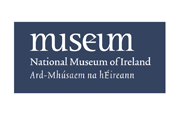Turtle Bunbury Website article
Stephen John Tierney is a Corribean. At least, that is what some call those who live along the shores of the majestic Lough Corrib in County Galway. His home, Mayfly Cottage, lies in the wet and rocky high ground just north of Oughterard, a stone’s throw from the sumptuous Victorian manor house hotel of Currarevagh. Indeed, the cottage where he and his wife live, was formerly Currarevagh’s laundry house. Their three sons and two daughters are all grown up and gone. We met by a bridge over the Owenriff River, morning sunlight piercing through the surrounding woodlands.
Stephen John’s family has worked with Currarevagh since the nineteenth century. An uncle was coachman to the estate’s former owner, Mr Oliver, but when the landlord died on Christmas Day 1914, ‘that was the end of my uncle’s time’. The redundant coachman sailed for America but was soon drafted into the army and sent back to Europe to fight in the First World War. Three weeks later, he was wounded in action and that gave him a pension for life. ‘He said the war was the best thing that ever happened to him,’ chuckles his nephew.
The oldest of ten children, Stephen John has run a fifty-acre cattle farm for most of his life, though he would not expect his sons to follow in his footsteps. ‘Make a living on it if you can and if you can’t, pack it up. Farms are a thing of the past,’ he maintains, ‘and all that’s keeping them going are old lads like me at seventy! A young lad doesn’t want to know about it.’
He is a remarkably well-read man, as at home with Shakespeare and current affairs as he is with Maurice Semple’s local history. ‘I read every sort of book that ever existed,’ he says. Such devotion is perhaps a compensation for having to leave school young. He had not wanted to leave but ‘the teacher never got a bob for teaching you after you were fourteen so, man or woman, out the door you went once you’re fourteen’. By a series of coincidences, he was actually the only child in his class for the last four months of his schooldays. As such, he effectively became a servant to the teacher, ‘an old man, born in America of Irish parents’. ‘All I ever did was go down and post letters for the teacher, get the paper for him, get meat in the butcher’s shop and all this sort of thing.’

Stephen John Tierney’s father (right) with Walter Macken, the writer, in the late 50s or early 60s. Photo: Lisa Moore.
When electricity arrived in Lough Corrib in 1954, Stephen John recalls passing houses where ‘old lads would say, “There’s nothing like that coming in here – that’s pure witchcraft.”’
Likewise, the ‘voices’ unleashed by the electric wireless provoked a major outcry. ‘People had an idea these things weren’t good for you,’ he says, ‘but by the time the television came, they were used to it.’
Stephen John has little patience with superstitions. He recalls a tale his grandfather told about the funeral of the Reverend Alexander Dallas, a controversial Protestant clergyman who ran a soup kitchen along the lake shore during the Great Famine. His grandfather told him that ‘a flash of lightning lifted Dallas up out of the bed’. Stephen John regards this as ‘codology of the highest order’. ‘It’s lunatic’s talk – if lightning lifted him out of the bed, it would have smashed the house to pieces.’
Besides which, you don’t need to make things up to have a good story. He lights a Gold Flake cigarette and recalls a friend who happened to be night watchman for ‘a gang of poitín makers’ on one of Lough Corrib’s islands.
The police were ‘dead down’ on poitín at this time and one night made an undercover raid and caught everyone, bar Tom. ‘Now Tom was guilty of nothing,’ counsels Stephen John. ‘But he was the watchout – and he was the best man in Ireland to bring you a bottle of poitín if you wanted one.’
Tom was on the run for three months before a squad car chanced upon him. As it happened, he had two bottles of poitín secreted in his pockets, a gift for an old couple in Oughterard. ‘Now if you ever heard of a man with nerves of steel,’ marvels Stephen John, ‘this was him.’
Tom was brought into the barracks and sat down in front of seven officers. He was interrogated and cross-examined and eventually asked to sign ‘a heap of literature’. Tom ‘stooped down and the top of one of the bottles came up and out’.
Tom’s breath froze as he ‘signed his name quick as a flash and straightened up again – they never seen it!’
Tom duly left the barracks, a free man. ‘He walked 100 yards before his two legs started to go with the fear.’
And that, says Stephen John, is ‘a very fact’.
With thanks to Lisa Moore.









No Comments
Add a comment about this page